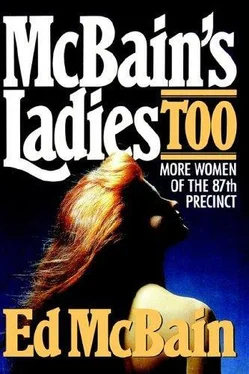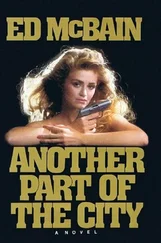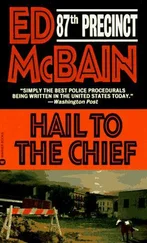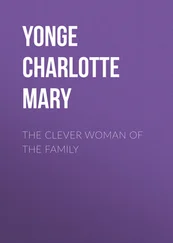Ed McBain - McBain's Ladies Too - More Women of the 87th Precinct
Здесь есть возможность читать онлайн «Ed McBain - McBain's Ladies Too - More Women of the 87th Precinct» весь текст электронной книги совершенно бесплатно (целиком полную версию без сокращений). В некоторых случаях можно слушать аудио, скачать через торрент в формате fb2 и присутствует краткое содержание. Город: New York, Год выпуска: 1989, ISBN: 1989, Издательство: Mysterious Press, Жанр: Полицейский детектив, на английском языке. Описание произведения, (предисловие) а так же отзывы посетителей доступны на портале библиотеки ЛибКат.
- Название:McBain's Ladies Too: More Women of the 87th Precinct
- Автор:
- Издательство:Mysterious Press
- Жанр:
- Год:1989
- Город:New York
- ISBN:9780892962853
- Рейтинг книги:3 / 5. Голосов: 1
-
Избранное:Добавить в избранное
- Отзывы:
-
Ваша оценка:
- 60
- 1
- 2
- 3
- 4
- 5
McBain's Ladies Too: More Women of the 87th Precinct: краткое содержание, описание и аннотация
Предлагаем к чтению аннотацию, описание, краткое содержание или предисловие (зависит от того, что написал сам автор книги «McBain's Ladies Too: More Women of the 87th Precinct»). Если вы не нашли необходимую информацию о книге — напишите в комментариях, мы постараемся отыскать её.
McBain's Ladies Too: More Women of the 87th Precinct — читать онлайн бесплатно полную книгу (весь текст) целиком
Ниже представлен текст книги, разбитый по страницам. Система сохранения места последней прочитанной страницы, позволяет с удобством читать онлайн бесплатно книгу «McBain's Ladies Too: More Women of the 87th Precinct», без необходимости каждый раз заново искать на чём Вы остановились. Поставьте закладку, и сможете в любой момент перейти на страницу, на которой закончили чтение.
Интервал:
Закладка:
Carella wondered what to say next. Should he go through the tired "Some of My Best Friends Are Blacks" routine? Should he explain that Arthur Brown, a detective on the 87th Squad, was in fact happily married and that he and his wife, Caroline, had spent hours in the Carellas' house discussing toilet training and school busing and, yes, even racial prejudice? Should he defend himself as a white man in a white man's world, when this woman's husband — a black man — had been robbed of his life in a section of the precinct that was at least fifty-percent black? Should he ignore the possibility that Chloe Chadderton, who had immediately flared upon mention of marital infidelity, was as suspect in this damn case as anyone else in the city? More suspect, in fact, despite the screaming and the hollering and the tears, despite the numbness as she'd listened to the details.
White or black, they all seemed numb, even the ones who'd stuck an icepick in someone's skull an hour earlier; they all seemed numb. The tears were sometimes genuine and sometimes not; sometimes, they were only tears of guilt or relief. In this city where husbands killed wives and lovers killed rivals; in this city where children were starved or beaten to death by their parents, and grandmothers were slain by their junkie grandsons for the few dollars in their purses; in this city any immediate member of the family was not only a possible murderer but a probable one. The crime statistics here changed as often as did the weather, but the latest ones indicated a swing back to so-called family homicides, as opposed to those involving total strangers, where the victim and the murderer alike were unknown to each other before that final moment of obscene intimacy.
A witness had described George Chadderton's killer as a tall, skinny man, almost a boy. A man who looked like a teen-ager. Chloe Chadderton was perhaps five feet nine inches tall, with the lithe, supple body of a dancer. Given the poor visibility of the rain-drenched night, mightn't she have passed for a teenage boy? In Shakespeare's time, it was the teen-age boys who'd acted the women's roles in his plays. Chloe had taken offense at a question routinely asked and now chose to cloud the issue with black indignation, perhaps genuine, perhaps intended only to bewilder and confuse. So Carella looked at her, and wondered what he should say next. Get tough? Get apologetic? Ignore the challenge? What? In the silence, rain lashed the single window in the kitchen. Carella had the feeling it would never stop raining.
"Ma'am," he said, "we want to find your husband's murderer. If you'd feel more comfortable with a black cop, we've got plenty of black cops, and we'll send some around. They'll ask the same questions."
She looked at him.
"The same questions," he repeated.
"Ask your questions," she said, and folded her arms across her breasts.
"All right," he said, and nodded. "At any time during the past few weeks did you notice anything strange about your husband's behavior?"
"Strange how?" Chloe said. Her voice was still edged with anger, her arms were still folded defensively across her breasts.
"Anything out of the ordinary, any breaks in his usual routine — I take it you knew most of his friends and business acquaintances."
"Yes, I did."
" Were there any such breaks in his usual routine?"
"I don't think so."
"Did your husband keep an appointment calendar?"
"Yes."
"Is it here in the apartment?"
"In the bedroom. On the dresser."
"Could I see it, Mrs. Chadderton?"
"Yes," she said, and rose and left the room. Carella and Meyer waited. Somewhere outside, far below, a drainpipe dripped steadily and noisily. When Chloe came back into the room, she was carrying a black appointment book in her hand. She gave it to Carella, and he immediately opened it to the two facing pages for the month of September.
"Today's the fifteenth," Meyer said.
Carella nodded, and then began scanning the entries of the week beginning September eleventh. On Monday at 3:00 p.m., according to the entry scrawled in black ink in the square for that date, George Chadderton had gone for a haircut. On Tuesday at 12:30 p.m., he'd had lunch with someone identified only as Charlie. Carella looked up.
"Who's Charlie?" he said.
"Charlie?"
"'Lunch 12:30 p.m., Charlie,'" Carella read.
"Oh. That's not a person, it's a place. Restaurant called Charlie down on Granada Street."
"Have any idea who your husband had lunch with that day?"
"No. He was always meeting with people, discussing gigs and contracts and like that."
"Didn't Ambrose Harding handle all his business affairs?"
"Yes, but George liked to meet who he'd be playing for, the promoter or the man who owned the hall or whoever."
Carella nodded and looked down at the calendar again. There were no entries for Wednesday. For Thursday, the fourteenth, there were two entries: "Office, 11:00 a.m." and "Lunch 1:00 p.m. Harry Caine."
"What would 'Office' be?" Carella asked.
"Ames office."
"And who's Harry Caine?"
"I don't know."
Carella looked at the book again. For tonight, Friday, September fifteenth, Chadderton had written "Graham Palmer Hall, 8:30, Ame pickup 7:30." For tomorrow, Saturday the sixteenth, he had written "C. J. at C. C. 12 noon."
"Who's C. J.?" Carella asked, looking up.
"I don't know," Chloe said.
"How about C. C? Does that mean anything to you?"
"No."
"Would it be a person or a place?"
"I have no idea."
"But you did know most of his friends and business acquaintances?"
"Yes, I did."
"Were there any recent conversations or meetings with strangers?"
"Strangers?"
"People you didn't know. Like this C. J., for example. Were there people whose names you didn't recognize when they phoned? Or people you saw him with, who—"
"No, there was nobody like that."
"Did anyone named C. J. ever phone here?"
"No."
"Did your husband mention that he had a meeting with this C. J. tomorrow at noon?"
"No."
"Mind if I take this with me?" Carella asked.
"Why do you need it?"
"I want to study it more closely, prepare a list of names, see if you can identify any of them for me. Would that be all right?"
"Yes, fine."
"I'll give you a receipt for the book."
"Fine."
"Mrs. Chadderton, when I spoke to Ambrose Harding earlier tonight, he mentioned that your husband's songs — some of his songs — dealt with situations and perhaps personalities here in Diamondback. Is that true?"
"George wrote about anything that bothered him."
"Would he have been associating lately with any of the people he wrote about? To gather material, or to—"
"You don't have to do research to know what's happening in Diamondback," Chloe said. "All you need is eyes in your head."
"When you say he wrote these songs—"
"He wrote the songs down before he sang them. I know that's not what calypso used to be, people used to make them up right on the spot. But George wrote them all down before hand."
"The words and the music?"
"Just the words. In calypso, the melody's almost always the same. There're a dozen melody lines they use over and again. It's the words that count."
"Where did he write these words?"
"What do you mean where ? Here in the apartment."
"No, I meant…"
"Oh. In a notebook. A spiral notebook."
"Do you have that notebook?"
"Yes, it's in the bedroom, too."
"Could I see it?"
"I suppose so," she said, and rose wearily.
"I wonder if I could look through his closet, too," Carella said."
"What for?"
"He was dressed distinctively tonight, the red pants and the yellow shirt. I was wondering…"
Читать дальшеИнтервал:
Закладка:
Похожие книги на «McBain's Ladies Too: More Women of the 87th Precinct»
Представляем Вашему вниманию похожие книги на «McBain's Ladies Too: More Women of the 87th Precinct» списком для выбора. Мы отобрали схожую по названию и смыслу литературу в надежде предоставить читателям больше вариантов отыскать новые, интересные, ещё непрочитанные произведения.
Обсуждение, отзывы о книге «McBain's Ladies Too: More Women of the 87th Precinct» и просто собственные мнения читателей. Оставьте ваши комментарии, напишите, что Вы думаете о произведении, его смысле или главных героях. Укажите что конкретно понравилось, а что нет, и почему Вы так считаете.












